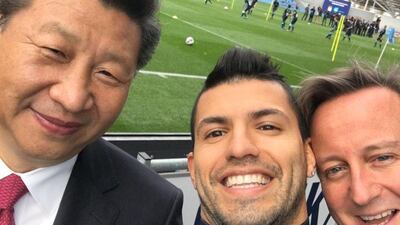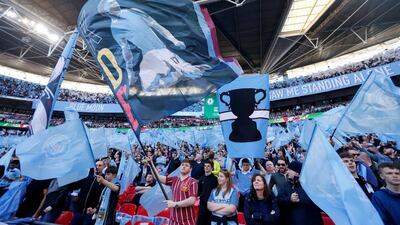February was an eventful month for Manchester City even by the standards of a football club scaling new heights of performance on the pitch and ambition off it. February's 6-0 demolition of Chelsea was hailed as one of the greatest displays in English football history. Then came their first trophy of the season with victory in the League Cup final (meaning that a history-making quadruple – add the Premier League, FA Cup and Champions League – remains an achievable goal). Oh, and the club's owners announced the acquisition of a Chinese side that finished third from bottom in the country's Division 2 League, South last season.
Easy to guess what made the headlines, then. But for long-term global significance, the purchase of Sichuan Jiuniu FC will surely prove to be a story bigger even than that potential quadruple.
There are various forces at work here. One is City Football Group's strategy of building a portfolio of clubs around the world (Jiuniu are joining a network already established in the US, Australia, Spain, Japan and Uruguay, as well as England – with India tipped to be next). That adds up to around 1,000 footballers on their collective books. Players who can be schooled in the Pep Guardiola style of play that helped earn Manchester City a record 100 points in the Premier League last season. Players who can benefit from the empire's groundbreaking statistical operation that crunches the numbers across the continents. Players who can move within the family to the benefit of club and individual.
Now OK, we’re unlikely to see any of Jiuniu’s current squad turning out at the Etihad any time soon. But China has a proven ability to create stars in sports of its choosing (Exhibit A: a table-topping 48 gold medals at 2008’s Beijing Olympics). And it has a football-mad President. When Xi Jinping visited Britain in 2015, he stopped off at the City Football Academy in Manchester and made a point of stating the importance of the sport to his country (within weeks, a group of Chinese investors had taken a $400m stake in City Football Group).

So don’t discount the idea of another Chinese player gracing City’s ranks before too long (Sun Jihai was the first, in 2002).
The synergistic nature of this deal is evident in the appointment of Melbourne City’s chief executive to the equivalent role at Jiuniu. But why choose this team in the first place? Well, there’s certainly been an overheating in China’s football economy with the top teams expending vast sums on players often nearing the end of their careers. Jiuniu clearly represent a much cheaper way into the market.
And what a market it promises to be: a football-fanatical country of nearly 1.4 billion. No wonder it's been a regular destination of Premier League teams on summer tours dedicated to spreading the word and selling shirts.
But if City are right, their strategy might be a more effective way to tap into Eastern interest. Imagine if Jiuniu could climb the divisions and eventually top the Chinese Super League. Imagine how a growing following for Jiuniu could be channelled towards Manchester City and other clubs in the family. And think how Jiuniu could become a lucrative conduit for Chinese businesses with ambitions abroad, and foreign businesses with ambitions there.
Also worth noting is that the acquisition comes at a time when the UAE is increasingly pivoting to the East. President Xi was in the Emirates last July for a historic three-day visit – an encounter that symbolised the increasingly close relationship between the countries.
It’s worth putting all this in the context of football’s evolution-cum-revolution. A European Super League has long been discussed. That would mean Manchester City entertaining Barcelona rather than Burnley on a Saturday afternoon. Then there’s the prospect of an expanded Club World Cup, which could come to rival the existing World Cup for national sides. And there’s the possibility of Major League Soccer in the US expanding into Mexico and further into Canada – another economic game-changer.
So who would be best equipped to exploit this globalisation? Not Real Madrid, who seem to have blown the whistle on the Galactico era as their financial situation sours. Not Manchester United, whose American owners appear more interested in banking dividends than building for their future. And not Barcelona, perhaps too tied to their community to embrace the bigger picture.
Which brings us to Manchester City’s problem. Does "glocalisation" work? Can you be a global club that retains the support of the local community, their lifeblood. The work their Abu Dhabi owners have done in the Eastlands area that City call home has been admirable. But with a global fanbase ever more important – and the constant need for more revenue from match ticket sales – can they retain the local love?
Either way, what is undeniable is this: football is changing. Clubs have a choice between leading that change, and lagging behind it. And City, undoubtedly, are leading it.

